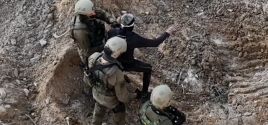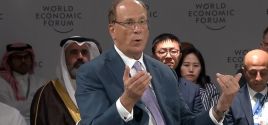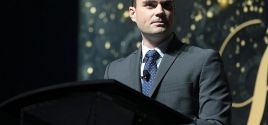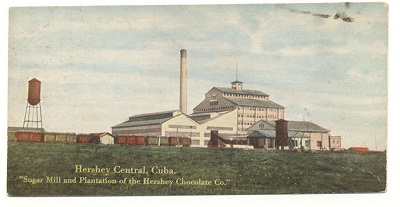The Fascinating History of Hershey, Cubaby Jacob G. HornbergerMay. 07, 2015 |
Popular 
Video Shows Israeli Soldiers 'Using Palestinian as a Human Shield'

BlackRock CEO: 'Xenophobic' Countries With Shrinking Populations May Be The 'Big Winners' in AI-Driven Future

"We Were There First and Foremost for Our Country of Israel," UNC Frat Bro Tells Fox News

Report: Daily Wire Got Secret Gag Order Against Candace Owens 'While Publicly Negotiating a Debate'

House Passes 'Antisemitism Awareness Act' to Silence Criticism of Israel as Hate Speech
  Yesterday the Washington Post carried a fascinating article about a small town in Cuba named Hershey. The history of the town provides valuable lessons about America's heritage of economic liberty as well the socialist economic system established by Cuban leader Fidel Castro. Yesterday the Washington Post carried a fascinating article about a small town in Cuba named Hershey. The history of the town provides valuable lessons about America's heritage of economic liberty as well the socialist economic system established by Cuban leader Fidel Castro.Hershey, Cuba, was founded by Milton Hershey, the American chocolate tycoon who founded Hershey, Pennsylvania. Hershey invested his own money to found this town around 30 miles east of Havana. The town revolved around a sugar mill, "once among the world's most advanced," according to the Post. Everything in the town was first-class. "Neatly laid residential streets," houses with clapboard siding, and "some of the only screened-in porches anywhere in Cuba." Also a company hotel and "big, stately flagstone homes, where the American supervisors lived." There was also the Hershey Social Club and a golf course. The Post writes: Hershey's greatest technological achievement was a state-of-the-art electric railway running 57 miles from Havana to the port of Matanzas, with his town in the middle. The rail cars could gather raw cane for delivery to the mill and ship it out again through the ports in either city, with passenger service that linked dozens of rural towns and hamlets along the way. The railway was the only one of its kind in Cuba.Hershey established his town in Cuba in 1916. Keep in mind that Americans once lived in the most unusual society in history. Imagine: A society that for more than 100 years had lived with no income tax, IRS, Social Security, Medicare, Medicaid, minimum wage, drug laws, welfare, fiat (i.e., paper) money, Federal Reserve, foreign aid, embargoes, sanctions, torture, gun control, assassination, military-industrial complex, national-security establishment, CIA, NSA, Pentagon, and very few immigration controls and economic regulations. That's what made America different. That's what made the United States exceptional. That's what made Americans the freest people in history. The Post writes: It was a time of supreme American confidence in the power of private industry as the engine of social progress: a force that could build a New York skyscraper 800 feet into the air, assemble automobiles in a matter of hours and make a delicacy for the wealthy -- chocolate -- into an affordable treat for the masses.Americans were free to keep everything they earned and free to do anything they wanted with their own money. Since there was no economic embargo against Cuba, Americans were free to travel there and invest their money without fear of being put into jail by their own government officials. And that's what Hershey did. He invested his own money in a remarkable profit-seeking venture in Cuba. In the process, he benefited the Cuban people with employment opportunities and economic activity. That's not all. According to the Post, Along with the mill -- one of the most technically sophisticated in the world at the time -- Hershey built modern utilities, schools, health clinics and subsidized housing for his workers. The town's ballpark was one of the island's most beautiful, drawing teams from all over the island.The only downside to Hershey's town was that it was segregated. "Black people weren't allowed to cross into this side of town, and we weren't allowed to live in these houses either," said Berta Campoalegre, 81. In 1959 Fidel Castro came into power in Cuba and established a socialist economic system. That meant using the force of government to equalize wealth, which meant taking from the rich and giving to the poor. Obviously, prosperous businesses provided a tempting target for Castro and his socialist comrades. On the list was Hershey, Cuba. By this time, however, Hershey had sold the entire operation to one of the richest men in Cuba, Julio Lobo. To cut costs, Lobo had shut down the town cafeteria, which, under Milton Hershey, had offered food at reasonable prices to people on the island. Castro nationalized everything in Hershey. He immediately reopened the cafeteria and posted a sign saying "Thanks to the Revolution." Fulfilling the Revolution's aim of taking from the rich and giving to the poor, Castro redistributed the homes in Hershey to Cuban poor people. Castro also nationalized every other business on the island. The result? Not surprisingly, the Cuban bureaucrats ran the entire operation in Hershey into the ground, along with all the other enterprises they nationalized. What socialists just don't get is the critically important role of an entrepreneur in raising people's standard of living. Socialists see a great big, successful business operation and they think to themselves, "Oh, that's easy. Anyone can run that." Rather than going out and raising the money to start their own business, they simply use the force of government to confiscate existing businesses and think that government bureaucrats are going to be able run them as well as private-sector entrepreneurs. At first socialism is hunky dory because the government is "rich" and "benevolent." After all, there is a lot of wealth to confiscate in the early stages of a socialist system. But gradually, the downward economic spiral begins and ends up destroying the entire economic base of the society. That's what happened with Hershey and every other enterprise that was confiscated by Castro and his socialist comrades. The sugar mill in Hershey "began grinding toward a slow death and closed for good in 2003." Today, Hershey, Cuba, is like a dilapidated ghost town, with the old, worn down buildings resembling the rest of Cuba. The irony was that the United States began moving in a socialist direction long before Castro came to power. The progressive income tax and the Federal Reserve came into existence in 1913. Social Security came into existence in the 1930s, setting the stage for the entire American welfare state, which is nothing more than a variation of socialism. Just like in Cuba under Castro, the guiding principle of the U.S. government became equalization of wealth -- using the income tax and the IRS to take from the rich and using federal bureaucracies to give money to the poor. With his nationalization program, Castro simply carried out those socialist principles to their logical conclusion. It sometimes surprises Americans to learn that the socialist programs that Castro is most proud of in Cuba are: public schooling, Social Security, Medicare and Medicaid, the same socialist programs that Americans are also most proud of here in the United States. America's move toward socialism was also demonstrated by the way that President Kennedy attempted to counter Castro's popularity among the poor in Latin America. Kennedy's economic program was called the Alliance for Progress and entailed taking money from America's rich and giving it to the Latin American poor. In other words, Kennedy thought he could defeat socialism with socialism. What Milton Hershey built in Cuba exemplified what America was once all about -- not about income taxation, state-mandated charity, welfare, embargoes, sanctions, torture, invasions, occupations, socialism, interventionism, foreign aid, militarism, assassinations, and regime-change operations but rather about economic liberty and peaceful, harmonious economic and cultural interactions between the private sector of Americans and the people of the world. The story of Hershey, Cuba, points in the direction in which America needs to head today. By the way, did I mention that when Milton Hershey died, he left his entire fortune to charity? _ Jacob G. Hornberger is founder and president of The Future of Freedom Foundation. He was born and raised in Laredo, Texas, and received his B.A. in economics from Virginia Military Institute and his law degree from the University of Texas. He was a trial attorney for twelve years in Texas. He also was an adjunct professor at the University of Dallas, where he taught law and economics. In 1987, Mr. Hornberger left the practice of law to become director of programs at the Foundation for Economic Education. He has advanced freedom and free markets on talk-radio stations all across the country as well as on Fox News' Neil Cavuto and Greta van Susteren shows and he appeared as a regular commentator on Judge Andrew Napolitano's show Freedom Watch. View these interviews at LewRockwell.com and from Full Context. Send him email. |



